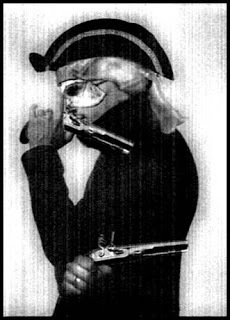Emily C.A. Snyder's Blog, page 19
August 14, 2011
Austenesque Extravaganza!
Don't forget to join the Austenesque Extravaganza...today at 4 p.m. EST on Twitter! Just put #Austenesque into your post and join the fun!
In honor of the event (and some exciting news from Girlebooks.com) I've also worked on my author website. Or follow one of the links below to that page!
[image error]
[image error]
[image error]
Hope to see you there!
In honor of the event (and some exciting news from Girlebooks.com) I've also worked on my author website. Or follow one of the links below to that page!
[image error]
[image error]
[image error]
Hope to see you there!
Published on August 14, 2011 12:26
August 9, 2011
Author Interview
Many thanks to Vincent Lowry for the Q&A!
Check out his blog at: Rate My Book !
1) What is your name and bio?
My name is Emily C. A. Snyder, a theatre director, playwright and novelist, who has a yen for the language of Shakespeare, Dickens and Wilde, and the unknown authors who passed down our fairy tales.
2) What is your book title, synopsis, and where can readers find it?
My most recent novel, Nachtsturm Castle is published through Girlebooks.com , who provides wonderful e-and-paperback books of books by the gals for the gals.
Nachtsturm Castle: A Gothic Austen Novel is a sequel and pastiche of Jane Austen's Northanger Abbey. Happily married Catherine and Henry Tilney set off to the Alps for a long delayed honeymoon. Catherine, having grown up in Austen's novel, therefore refuses to believe anything extraordinary or Gothic can possibly be real. But as the Tilneys' stay at Nachtsturm Castle proves, sometimes the fantastical becomes reality!
Actually, a recent reviewer, Jeffrey Ward, probably summed it up best:
Nachtsturm Castle is available through Girlebooks.com and Amazon.com, in e-book and in paperback!
3) Where do you come up with your ideas?
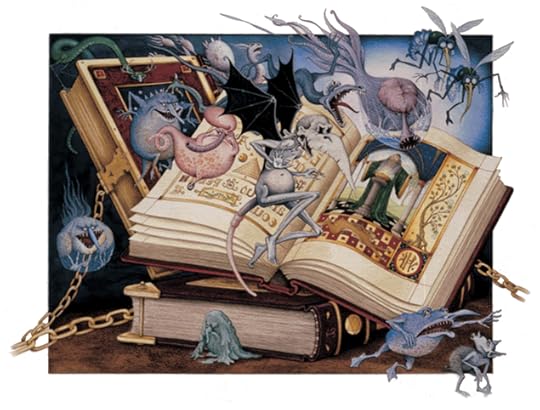
Terry Pratchett said that ideas sleet through the multiverse and there are some people whose brains just attract a lot of celestial detritus. I think I'm one of those. It's harder not to come up with new ideas. Ideas aren't the hard part; getting ideas down in a satisfactory manner in a reasonable amount of time is the hard part!
However, the germinus for Nachtsturm Castle was, to be frank, the desire to help Austen prove her point that Catherine had difficulty with issues of what to believe and what not to believe. I love Austen very much (I think Persuasion is divine), but Northanger Abbey - being her first novel, and therefore not as formed as her later works - seemed fair game for paraliterature. Besides, the set-up to mirror the original, the opportunity to make fun of and pay homage to the over-purpled prose of Gothic literature, and my own pleasure of returning at least in word to Austria (where I spent a very happy semester with the foothills of the Alps five feet out my window) proved irresistable. Moreover, I was going crazy at a desk job. (A good reason to write a novel if there ever was one!)
The idea for Niamh and the Hermit came from my college professor pointing out that man cannot stand sustained beauty in this fallen world, and my own love of inventing fairy tales. Charming the Moon which takes place in the same world, are two folk tales about how the Sun and the Moon returned to the sky. I told those stories to my youngest brother when I didn't want to read him Goodnight Moon for the umpteenth time...which was often. (Good book! Just not for weeks on end.) You can read more here!
4) What books/authors do you like to read?
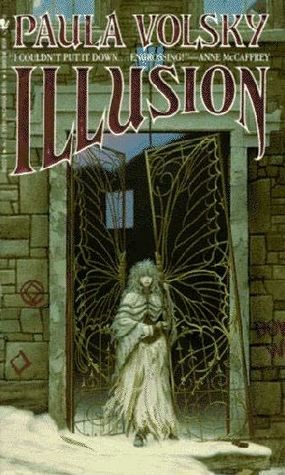 Paula Volsky and Teresa Edgerton are the two authoresses who have shaped my views on fantasy the most. I truly think Paula Volsky's Illusion to be the best and most detailed fantasy ever written.
Paula Volsky and Teresa Edgerton are the two authoresses who have shaped my views on fantasy the most. I truly think Paula Volsky's Illusion to be the best and most detailed fantasy ever written.
Terry Pratchett - if he writes it, I will read it. Numerous times. Again.
For classics, I like Austen, Chesterton, Lewis, Dante, Wilde, and Shakespeare, with a side of Sayers (the perfect mystery writer).
I'm also a fan of non-fiction: Chesterton, Lewis, Aristotle, and several current Catholic apologists. If it's a good book pertaining to Shakespearean performance, or the history or theory of theatre, either as a source document (Brook's "The Empty Space") or as commentary, I'll read it, underline it, and write a dialogue in the margins!
5) What's your next writing project?
I'm taking a break from playwriting for the nonce, since I wrote and either directed or had performed seven original plays since January 2011 (phew), but in novels I'm working on another Twelve Kingdoms piece, about the fall of the princes to the ShadowQueen. Originally, this was the longest of the stories I told to my brother to get him to sleep, and it was called Tamerin and Isllel for the main characters: the last of the princes, and the princess who saves him. ShadowQueen is a better title. However, I've had those seven plays and thirteen-ish performances and my novel writing schedule has been out of whack.
[image error] I'm also figuring out how best to write/present my epistolary fantasy, The Sable Valentine, which includes maps and newspapers and diagrams and all sorts of fun stuff, and which can be previewed here!
And there's good news for my Austen paraliterature likers: I've got another novel to revise, called "Presumption" based on the romance between Col. Fitzwilliam and Maria Lucas from Pride and Prejudice!
Anyone who wants to specially request something, and then to bug me about it, is more likely to receive a finished product. So...nudge away!
Check out his blog at: Rate My Book !
1) What is your name and bio?
My name is Emily C. A. Snyder, a theatre director, playwright and novelist, who has a yen for the language of Shakespeare, Dickens and Wilde, and the unknown authors who passed down our fairy tales.
2) What is your book title, synopsis, and where can readers find it?
My most recent novel, Nachtsturm Castle is published through Girlebooks.com , who provides wonderful e-and-paperback books of books by the gals for the gals.
Nachtsturm Castle: A Gothic Austen Novel is a sequel and pastiche of Jane Austen's Northanger Abbey. Happily married Catherine and Henry Tilney set off to the Alps for a long delayed honeymoon. Catherine, having grown up in Austen's novel, therefore refuses to believe anything extraordinary or Gothic can possibly be real. But as the Tilneys' stay at Nachtsturm Castle proves, sometimes the fantastical becomes reality!
Actually, a recent reviewer, Jeffrey Ward, probably summed it up best:
Moonlight! Castles! Ghosts! Storms! Secret trap doors! Suicide! Grave yards! Mistaken Identities! Carriage accidents! Gypsies! Hauntings! A kidnapping! Purloined letters! A duel! Swooning! Wild Pursuits! Demonic possession! A disputed inheritance! Three romances! A ransacking! Ancient curses! A stolen will and testament! Dank subterranean passageways!
Multi-talented Emily C. A. Snyder has managed to pack the above list (and more) into the 139 page Nachtstürm Castle, a sophisticated Gothic fantasy sequel, taking up the further adventures of Henry and Catherine Tilney where our divine Miss Austen finished the last lines of Northanger Abbey.
Read full review
Nachtsturm Castle is available through Girlebooks.com and Amazon.com, in e-book and in paperback!
3) Where do you come up with your ideas?

Terry Pratchett said that ideas sleet through the multiverse and there are some people whose brains just attract a lot of celestial detritus. I think I'm one of those. It's harder not to come up with new ideas. Ideas aren't the hard part; getting ideas down in a satisfactory manner in a reasonable amount of time is the hard part!
However, the germinus for Nachtsturm Castle was, to be frank, the desire to help Austen prove her point that Catherine had difficulty with issues of what to believe and what not to believe. I love Austen very much (I think Persuasion is divine), but Northanger Abbey - being her first novel, and therefore not as formed as her later works - seemed fair game for paraliterature. Besides, the set-up to mirror the original, the opportunity to make fun of and pay homage to the over-purpled prose of Gothic literature, and my own pleasure of returning at least in word to Austria (where I spent a very happy semester with the foothills of the Alps five feet out my window) proved irresistable. Moreover, I was going crazy at a desk job. (A good reason to write a novel if there ever was one!)
The idea for Niamh and the Hermit came from my college professor pointing out that man cannot stand sustained beauty in this fallen world, and my own love of inventing fairy tales. Charming the Moon which takes place in the same world, are two folk tales about how the Sun and the Moon returned to the sky. I told those stories to my youngest brother when I didn't want to read him Goodnight Moon for the umpteenth time...which was often. (Good book! Just not for weeks on end.) You can read more here!
4) What books/authors do you like to read?
 Paula Volsky and Teresa Edgerton are the two authoresses who have shaped my views on fantasy the most. I truly think Paula Volsky's Illusion to be the best and most detailed fantasy ever written.
Paula Volsky and Teresa Edgerton are the two authoresses who have shaped my views on fantasy the most. I truly think Paula Volsky's Illusion to be the best and most detailed fantasy ever written.Terry Pratchett - if he writes it, I will read it. Numerous times. Again.
For classics, I like Austen, Chesterton, Lewis, Dante, Wilde, and Shakespeare, with a side of Sayers (the perfect mystery writer).
I'm also a fan of non-fiction: Chesterton, Lewis, Aristotle, and several current Catholic apologists. If it's a good book pertaining to Shakespearean performance, or the history or theory of theatre, either as a source document (Brook's "The Empty Space") or as commentary, I'll read it, underline it, and write a dialogue in the margins!
5) What's your next writing project?
I'm taking a break from playwriting for the nonce, since I wrote and either directed or had performed seven original plays since January 2011 (phew), but in novels I'm working on another Twelve Kingdoms piece, about the fall of the princes to the ShadowQueen. Originally, this was the longest of the stories I told to my brother to get him to sleep, and it was called Tamerin and Isllel for the main characters: the last of the princes, and the princess who saves him. ShadowQueen is a better title. However, I've had those seven plays and thirteen-ish performances and my novel writing schedule has been out of whack.
[image error] I'm also figuring out how best to write/present my epistolary fantasy, The Sable Valentine, which includes maps and newspapers and diagrams and all sorts of fun stuff, and which can be previewed here!
And there's good news for my Austen paraliterature likers: I've got another novel to revise, called "Presumption" based on the romance between Col. Fitzwilliam and Maria Lucas from Pride and Prejudice!
Anyone who wants to specially request something, and then to bug me about it, is more likely to receive a finished product. So...nudge away!
Published on August 09, 2011 21:11
Q&A with Emily

What's that you say? You've always wanted to have a Q&A with Emily about books, about plays, about where rubber bands come from? (I've actually been asked the latter in sincerity. Nor is that the weirdest thing I've been asked. Being a schoolmarm is a two edged sword!)
Two out of three ain't bad, so please do join me anytime at Goodreads Discussion Board ! I'd love to see you there!
Published on August 09, 2011 02:19
Performative Writing
This is from a
Goodreads discussion
- join in the fun over there! Or check out the
Nachtsturm Castle
discussion board!

I've been thinking for a while that the sort of writing that works best for me (aka Gets Me To Finish Writing the Bloody Thing) is what I'll call "Performative Writing."
The idea behind it is not dissimilar to how people used to write novels: one chapter a time for a daily or weekly newspaper. Dickens wrote that way; Hugo wrote that way. It seems that Louisa May Alcott and Lucy Maude Montgomery both wrote that way if not for newspapers, then for their families. None of these authors would agree at all with Adams' blithe: "I love deadlines. I love the sound they make as they whoosh over my head." (A line later cribbed by the screenwriters of Pirates of the Caribbean 2.)
Performative writing today takes place most often in fanfiction and paraliterature, on message boards and blogs, but the result is the same: because there is an audience immediately reading, commenting, reflecting, guessing, criticizing, and otherwise egging the author on to Finish the Bloody Thing (FBT) just through the audience sitting there expectantly...the Bloody Thing is Finished.
I like Performative Writing. However, I've only ever been able to do so with Jane Austen paraliterature. I do wonder, though, whether it would be interesting...or profitable (a girl's gotta eat!) to return to Performative Writing with original work, too.
I'm of half a mind to see if something can be done - through apps or .pdf or something with one of my more sprawling novels, "The Sable Valentine," which is an epistolary fantasy, set in something between Regency-Victorian Europe. You can read the first bit of the first volume here: http://sablevalentine.blogspot.com/
Naturally, the second best thing to Performative Writing to FBT is an actual deadline. But considering that I just passed and then had to postpone indefinitely a deadline, I think that for someone with a theatrical bent like myself, Performative Writing trumps deadline.
Beginning thoughts which will now FBT now!
Published on August 09, 2011 01:34
August 8, 2011
Thoughts on writing "Christian Fantasy"
Recently I was asked a few questions, and I thought I'd post my answers here. Please share your own thoughts!
1) For me, being a Christian author (to be glib) is simply to be an author who is Christian. I've found that when you (any fiction author) sets out to expound upon philosophy/theology FIRST, without any particular care for plot and character, the book is doomed to fail. Christian authors, in their fervor to preach (a good thing), have an unfortunate habit of not relying either on themselves or on Him to allow His truths to shine through plot and character. Christian authors tend to bash religion into every paragraph, making it unbearable. BUT, no matter what one's faith, what one believes always shines through.
2) God's love is God's love no matter what the worldbuilding. Fantasy authors have fallen into the trap of using pantheons because it's a quick way to worldbuild, and pagans have jumped on that to preach their beliefs. For me, I have one world which knows the Gospel truth and so it isn't an issue; the characters are very open about their Christian faith. I also have another world which is purposefully set up with a pantheon (and a weird cult, and a bunch of other religions), because I wanted to show how those religions aren't the fullness of truth. They still experience Providence, but don't know what to call Him.
3) I think it helps to be non-jugemental (a good question!) OF PEOPLE in general. We judge actions, not souls - that's His job. As authors, therefore, we love our characters, flawed as they are, and allow the audience to judge their actions. Example, the folks who are in the weird cult in one of my novels: there are those who are just trying to live their lives, and then there are also those who are embracing the bad actions the cult implicitly encourages. They are judged by actions, not by faith.
4) Same thing that makes "pagan fantasy," or in Orwell's case "Mormon fantasy." It's the same as question one: your personal beliefs seep through. Pagans writing fantasy are hardly glib when they describe "the goddess" (or whatever). They're sincerely attempting to promulgate their worship. Aetheists such as Pullman literally kill God in their novels. Belief shines through. Christian fantasy is fantasy written by Christians with a Christian outlook. Some characteristics include encouragement towards understanding of God the Father, Son and Spirit, the sense of stumbling towards redemption, and the use of suffering as transfigured by grace.
5) In this case, it helps me personally to be a Catholic, since our tradition goes back waaaay far and includes those who've written pretty much every genre. But for Protestant Christians, and even worried Catholic Christians, the hesitancy typically springs from a misunderstanding of the use of "magic" in fantasy novels. Unfortunately, there's this belief that "you are what you read," hence if you read about magic in fiction, you will attempt to do magic in real life, which is a bad thing because it does spring from a demonic source.
The best I can say is that first, most readers - even young ones - generally understand what fiction is, and that the whole pleasure in reading fiction is that it isn't real. If a parent is worried, they should have a conversation (mostly for their peace of mind more than instructing a child) with their children about reality and fiction, and magic in both. The medievalists and renaissance writers, if required to mention "magic," would either show its demonic or tricky qualities (the sidhe court, the witches in Macbeth), or would make a point of saying that the "magic was not damnable" (As You Like It), i.e., that it's fictional.
If the person is willing to listen more, I'd explain that "magic" in fantasy novels is often science misunderstood, or natural to a certain creature (e.g., healing properties of alicorn) and hence not worrisome to humans, or bound by rules which means bound to be only in the fictional world *anyway.* Moreover, for myself, I still argue that the creation of a fantasy world is not dependent upon "magic," in the same way that science fiction IS bound upon science. However, I'll admit that "magic" - or rather, the impossible - is half the fun of fantasy, and that's why we read it.
Regardless, "what if" is not sinful.
6) I just think in terms of fantasy - always have. My earliest make-believe games were based on fairy tale motifs - orphaned princesses, evil witches or queens oppressing the former, dolls come to life, Robin Hood (although one might argue that isn't fantasy). Peter Pan was my childhood sweetheart for YEARS. Fantasy is the complete realm of imagination, since one even builds the world, sometimes justifying new rules of physics, let alone constantly playing with biology and chemistry, and all sorts of fun stuff. I like what Tolkein said about fantasy, that people criticize fantasy as "escapist" literature, which isn't laudable...unless one is escaping from a jail. Chesterton also put it well that fantasy follows the ordinary hero, who is able to recognize his world as extraordinary BECAUSE of who he is. Modern novels are based on insane characters in our hyper-sane world. Fantasy constantly frees us to escape both inward and outward at once.
7) The worst thing any writer can do is to write a dreadful novel, full of awful prose and worse plot, half-a-dimensional characters, and phrases that make me giggle at their placement (e.g., "He turned his back and kissed her"). So the worst sin a Christian author can do is write a terrible book. The second worst thing he can do - and Christian authors are prone to this - is beat the audience over the head with Bible quotes, or sudden sit-downs in the middle of a scene in order to have a conversation about theology, or the obvious redemption story, or black and white characters. You'll note all these authorial sins will result in the cardinal authorial sin of writing a bad book.

1) What does it mean to be a Christian author?
2) How do you show God's love in fantasy writing?
3) How do you keep from sounding judgmental of non-Christians in your writing?
4) What makes a novel "Christian fantasy" (if there is such a thing)?
5) How do you explain to other Christians that writing fantasy literature is not sinful?
6) Why did you decide to write fantasy?
7) What is the worst thing a Christian writer can do when writing fantasy?
1) For me, being a Christian author (to be glib) is simply to be an author who is Christian. I've found that when you (any fiction author) sets out to expound upon philosophy/theology FIRST, without any particular care for plot and character, the book is doomed to fail. Christian authors, in their fervor to preach (a good thing), have an unfortunate habit of not relying either on themselves or on Him to allow His truths to shine through plot and character. Christian authors tend to bash religion into every paragraph, making it unbearable. BUT, no matter what one's faith, what one believes always shines through.
2) God's love is God's love no matter what the worldbuilding. Fantasy authors have fallen into the trap of using pantheons because it's a quick way to worldbuild, and pagans have jumped on that to preach their beliefs. For me, I have one world which knows the Gospel truth and so it isn't an issue; the characters are very open about their Christian faith. I also have another world which is purposefully set up with a pantheon (and a weird cult, and a bunch of other religions), because I wanted to show how those religions aren't the fullness of truth. They still experience Providence, but don't know what to call Him.
3) I think it helps to be non-jugemental (a good question!) OF PEOPLE in general. We judge actions, not souls - that's His job. As authors, therefore, we love our characters, flawed as they are, and allow the audience to judge their actions. Example, the folks who are in the weird cult in one of my novels: there are those who are just trying to live their lives, and then there are also those who are embracing the bad actions the cult implicitly encourages. They are judged by actions, not by faith.
4) Same thing that makes "pagan fantasy," or in Orwell's case "Mormon fantasy." It's the same as question one: your personal beliefs seep through. Pagans writing fantasy are hardly glib when they describe "the goddess" (or whatever). They're sincerely attempting to promulgate their worship. Aetheists such as Pullman literally kill God in their novels. Belief shines through. Christian fantasy is fantasy written by Christians with a Christian outlook. Some characteristics include encouragement towards understanding of God the Father, Son and Spirit, the sense of stumbling towards redemption, and the use of suffering as transfigured by grace.
5) In this case, it helps me personally to be a Catholic, since our tradition goes back waaaay far and includes those who've written pretty much every genre. But for Protestant Christians, and even worried Catholic Christians, the hesitancy typically springs from a misunderstanding of the use of "magic" in fantasy novels. Unfortunately, there's this belief that "you are what you read," hence if you read about magic in fiction, you will attempt to do magic in real life, which is a bad thing because it does spring from a demonic source.
The best I can say is that first, most readers - even young ones - generally understand what fiction is, and that the whole pleasure in reading fiction is that it isn't real. If a parent is worried, they should have a conversation (mostly for their peace of mind more than instructing a child) with their children about reality and fiction, and magic in both. The medievalists and renaissance writers, if required to mention "magic," would either show its demonic or tricky qualities (the sidhe court, the witches in Macbeth), or would make a point of saying that the "magic was not damnable" (As You Like It), i.e., that it's fictional.
If the person is willing to listen more, I'd explain that "magic" in fantasy novels is often science misunderstood, or natural to a certain creature (e.g., healing properties of alicorn) and hence not worrisome to humans, or bound by rules which means bound to be only in the fictional world *anyway.* Moreover, for myself, I still argue that the creation of a fantasy world is not dependent upon "magic," in the same way that science fiction IS bound upon science. However, I'll admit that "magic" - or rather, the impossible - is half the fun of fantasy, and that's why we read it.
Regardless, "what if" is not sinful.
6) I just think in terms of fantasy - always have. My earliest make-believe games were based on fairy tale motifs - orphaned princesses, evil witches or queens oppressing the former, dolls come to life, Robin Hood (although one might argue that isn't fantasy). Peter Pan was my childhood sweetheart for YEARS. Fantasy is the complete realm of imagination, since one even builds the world, sometimes justifying new rules of physics, let alone constantly playing with biology and chemistry, and all sorts of fun stuff. I like what Tolkein said about fantasy, that people criticize fantasy as "escapist" literature, which isn't laudable...unless one is escaping from a jail. Chesterton also put it well that fantasy follows the ordinary hero, who is able to recognize his world as extraordinary BECAUSE of who he is. Modern novels are based on insane characters in our hyper-sane world. Fantasy constantly frees us to escape both inward and outward at once.
7) The worst thing any writer can do is to write a dreadful novel, full of awful prose and worse plot, half-a-dimensional characters, and phrases that make me giggle at their placement (e.g., "He turned his back and kissed her"). So the worst sin a Christian author can do is write a terrible book. The second worst thing he can do - and Christian authors are prone to this - is beat the audience over the head with Bible quotes, or sudden sit-downs in the middle of a scene in order to have a conversation about theology, or the obvious redemption story, or black and white characters. You'll note all these authorial sins will result in the cardinal authorial sin of writing a bad book.
Published on August 08, 2011 23:36
August 2, 2011
All Things Austenesque!
Look no further than
For the Love of Austen: Henry Tilney's Heroine: A Northanger Abbey Vignette
!
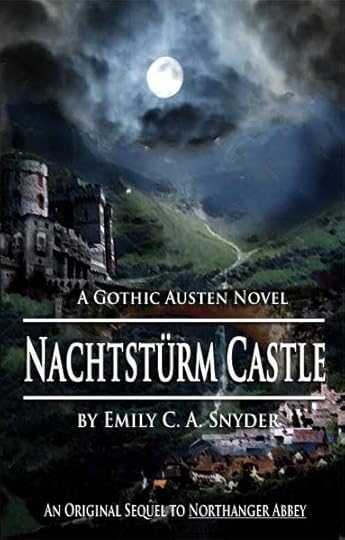 As an added bonus, you can fill out a form at the end to win a FREE copy of
Nachtsturm Castle
!
As an added bonus, you can fill out a form at the end to win a FREE copy of
Nachtsturm Castle
!
And make sure you follow all of the Austenesque Extravaganza! I'll be at the Twitter party on Sunday, August 14 - so make sure you're following me to join in the fun!
For those of you who want to jump into the world of Austen, may I suggest as well checking out Austen Aspirations: Build Your Own Austenesque Novel: The Set-Up . If you like National Novel Writing Month (NaNoWriMo) , why not make August your Austen writing month?
Last, but very much most, if you're not already a member of The Republic of Pemberley , then get thee thither to join in the largest gathering of Austenites on the web!
 As an added bonus, you can fill out a form at the end to win a FREE copy of
Nachtsturm Castle
!
As an added bonus, you can fill out a form at the end to win a FREE copy of
Nachtsturm Castle
!And make sure you follow all of the Austenesque Extravaganza! I'll be at the Twitter party on Sunday, August 14 - so make sure you're following me to join in the fun!
For those of you who want to jump into the world of Austen, may I suggest as well checking out Austen Aspirations: Build Your Own Austenesque Novel: The Set-Up . If you like National Novel Writing Month (NaNoWriMo) , why not make August your Austen writing month?
Last, but very much most, if you're not already a member of The Republic of Pemberley , then get thee thither to join in the largest gathering of Austenites on the web!
Published on August 02, 2011 10:56
July 31, 2011
Nachtsturm Castle: New Review
Jeffrey Ward over at
Austenprose.com
has written a lovely new (and lengthy) review of Nachtsturm Castle. Here's an excerpt:
Read more
Many thanks to Jeffrey! And make sure you follow me on Twitter for all the latest updates. Next Sunday, August 14, join me on Twitter for an Austenesque Extravaganza!
Moonlight! Castles! Ghosts! Storms! Secret trap doors!Suicide! Grave yards! Mistaken Identities! Carriage accidents! Gypsies! Hauntings! A kidnapping! Purloined letters! A duel! Swooning! Wild Pursuits! Demonic possession! A disputed inheritance! Three romances! A ransacking! Ancient curses! A stolen will and testament! Dank subterranean passageways!
Multi-talented Emily C. A. Snyder has managed to pack the above list (and more) into the 139 page Nachtstürm Castle, a sophisticated Gothic fantasy sequel, taking up the further adventures of Henry and Catherine Tilney where our divine Miss Austen finished the last lines of Northanger Abbey...
...This Novella should be…no…MUST be read-through a second time. On my re-read, morsels of enlightenment, sometimes as seemingly insignificant as a single word or short phrase, were revealed that greatly enhanced my understanding and pleasure regarding the convoluted mystery of Nachtstürm Castle. This reviewer cannot remember reading a novella, or any other work of this length, that had within its pages so much to offer the fancier of Gothic fiction. Read it after dark with your back to the wall and facing a locked door!
Read more
Many thanks to Jeffrey! And make sure you follow me on Twitter for all the latest updates. Next Sunday, August 14, join me on Twitter for an Austenesque Extravaganza!
Published on July 31, 2011 19:33
July 30, 2011
Charming Princes Review
The
Nancy Curvin Players
are performing Charming Princes this month in Geneva, New York.
And this is what they had to say about the play!
It's also a fun read! To buy a copy of the script or to apply for performance rights, check out Playscripts, Inc. !
And this is what they had to say about the play!
[Charming Princes is] a nonstop comedy for all ages with rich characters and revolves around a fairy tale that everyone knows and loves. It picks up right after Cinderella leaves the ball and, in this version, throwing her hard glass slipper at the not-so-charming Prince's head. The show runs roughly 30min and the play was chosen based on its potential for lots of audience participation and a positive message that it is what's on the inside that counts. With small cast, minimal set and fun costumes, this show fits perfectly with Curvin's style and reputation of shows.
It's also a fun read! To buy a copy of the script or to apply for performance rights, check out Playscripts, Inc. !
Published on July 30, 2011 18:56
July 28, 2011
Who Wears the Pants?
A Note from the Program of As You Like It
Performing at: The Portugese Club in Hudson, MA
Performing on: August 4-6, 2011 at 7 p.m.
In theatre, there are some actresses who may claim to specialize in "pants roles" – that is, an actress who is often cast as a man. This term makes less sense today, when everybody – male and female – wears pants almost exclusively. But when women were first allowed to act on the stage, in Europe and then eventually in England in 1660 (nearly fifty years after Shakespeare's death), "pants roles" became all the rage. After all, if a woman put on pants…you could see her legs! It was very sexy.
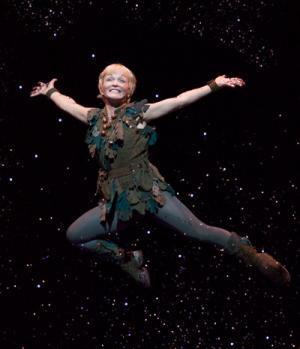 Operas took advantage of "pants roles," writing boy's parts for mezzo-sopranos and altos whose voices more closely resembled pre-pubescents – not unlike the modern stage convention of having a woman play the title role of Peter Pan. The famous Spanish playwright, Lope de Vega, praised the new opportunity, saying, "a breeches role usually pleases [the audience] very much." Shakespeare's comedies became very popular due to this new fad... so much so that we've forgotten that the Bard originally wrote his pants roles…to be played by men.
Operas took advantage of "pants roles," writing boy's parts for mezzo-sopranos and altos whose voices more closely resembled pre-pubescents – not unlike the modern stage convention of having a woman play the title role of Peter Pan. The famous Spanish playwright, Lope de Vega, praised the new opportunity, saying, "a breeches role usually pleases [the audience] very much." Shakespeare's comedies became very popular due to this new fad... so much so that we've forgotten that the Bard originally wrote his pants roles…to be played by men.
Shakespeare uses the trick of a woman impersonating a man three notable times: Rosalind in As You Like It, Viola in Twelfth Night, and briefly at the end of The Merchant of Venice, Portia. In the original, a male actor had the task of impersonating a woman…impersonating a man. Shakespeare even winks at his casting restrictions in Rosalind's epilogue when the actor says: "If I were a woman…!" which would have gotten a big laugh from Elizabethan audiences.
What a state is a modern actress in, then? It was quite easy for a male Orlando playing opposite a male "Rosalind" to act as though he believed his stage-love was a young boy…because it was. And it was easy for audiences to believe that Orlando wasn't stupid or near-sighted for being confused by his "Rosalind's" gender. In Shakespeare's time, the play…played.
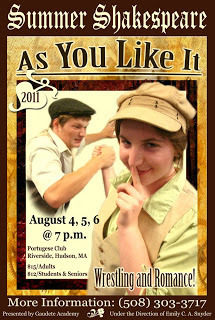
Nowadays, though, so many actresses who play Rosalind hope that their breeches will do most of the "manifying" for them. In those same productions, Orlando continues to be completely oblivious to the actress' high voice and shapely form. The question must be asked: does the inclusion of female actors make As You Like It unplayable?
The answer is a resounding: "No!" There's a reason Shakespeare is an acknowledged genius. For his text fully allows for multiple interpretations. Why couldn't Orlando be much more suspicious, far less duped by Rosalind's manly show? After all, Orlando seems to be constantly testing the boy "Rosalind," calling him/her "pretty youth," and finally giving him/her the ultimatum, "I can live no more by thinking."
Nor is Shakespeare's insight into women dated: in the modern age, women continue to struggle with pants roles – as single moms, as businesswomen, as women searching for some model other than a princess in pink. Women "still give the lie to their consciences," putting on an aggressive "manly" mask to show the world. What, then, is the remedy? Love, Shakespeare replies. Love that sees beyond the mask, and makes it empowering to wear a dress.
Performing at: The Portugese Club in Hudson, MA
Performing on: August 4-6, 2011 at 7 p.m.
In theatre, there are some actresses who may claim to specialize in "pants roles" – that is, an actress who is often cast as a man. This term makes less sense today, when everybody – male and female – wears pants almost exclusively. But when women were first allowed to act on the stage, in Europe and then eventually in England in 1660 (nearly fifty years after Shakespeare's death), "pants roles" became all the rage. After all, if a woman put on pants…you could see her legs! It was very sexy.
 Operas took advantage of "pants roles," writing boy's parts for mezzo-sopranos and altos whose voices more closely resembled pre-pubescents – not unlike the modern stage convention of having a woman play the title role of Peter Pan. The famous Spanish playwright, Lope de Vega, praised the new opportunity, saying, "a breeches role usually pleases [the audience] very much." Shakespeare's comedies became very popular due to this new fad... so much so that we've forgotten that the Bard originally wrote his pants roles…to be played by men.
Operas took advantage of "pants roles," writing boy's parts for mezzo-sopranos and altos whose voices more closely resembled pre-pubescents – not unlike the modern stage convention of having a woman play the title role of Peter Pan. The famous Spanish playwright, Lope de Vega, praised the new opportunity, saying, "a breeches role usually pleases [the audience] very much." Shakespeare's comedies became very popular due to this new fad... so much so that we've forgotten that the Bard originally wrote his pants roles…to be played by men.Shakespeare uses the trick of a woman impersonating a man three notable times: Rosalind in As You Like It, Viola in Twelfth Night, and briefly at the end of The Merchant of Venice, Portia. In the original, a male actor had the task of impersonating a woman…impersonating a man. Shakespeare even winks at his casting restrictions in Rosalind's epilogue when the actor says: "If I were a woman…!" which would have gotten a big laugh from Elizabethan audiences.
What a state is a modern actress in, then? It was quite easy for a male Orlando playing opposite a male "Rosalind" to act as though he believed his stage-love was a young boy…because it was. And it was easy for audiences to believe that Orlando wasn't stupid or near-sighted for being confused by his "Rosalind's" gender. In Shakespeare's time, the play…played.

Nowadays, though, so many actresses who play Rosalind hope that their breeches will do most of the "manifying" for them. In those same productions, Orlando continues to be completely oblivious to the actress' high voice and shapely form. The question must be asked: does the inclusion of female actors make As You Like It unplayable?
The answer is a resounding: "No!" There's a reason Shakespeare is an acknowledged genius. For his text fully allows for multiple interpretations. Why couldn't Orlando be much more suspicious, far less duped by Rosalind's manly show? After all, Orlando seems to be constantly testing the boy "Rosalind," calling him/her "pretty youth," and finally giving him/her the ultimatum, "I can live no more by thinking."
Nor is Shakespeare's insight into women dated: in the modern age, women continue to struggle with pants roles – as single moms, as businesswomen, as women searching for some model other than a princess in pink. Women "still give the lie to their consciences," putting on an aggressive "manly" mask to show the world. What, then, is the remedy? Love, Shakespeare replies. Love that sees beyond the mask, and makes it empowering to wear a dress.
Published on July 28, 2011 13:24
Nachtsturm Castle: Teaser Trailer!
Check out the teaser trailer for
Nachtsturm Castle: A Gothic Austen Novel
, from Girlebooks.com - available in Paperback or for your
Kindle from Amazon.com
! Enjoy!

Published on July 28, 2011 04:16

